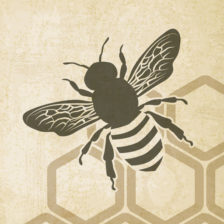In 1997, I spent a six-month sabbatical in the south of France hosted by ADAPI in the city of Aix en Provence, under the leadership of Pascal Jourdan. As part of that activity I produced an article for Bee Biz Magazine (no longer published) on my experiences.
I reported that beekeeping was a professional activity professional beekeeping in southern France and that the Varroa had become resistant to Fluvalinate in the country. I was able to see how the history of the craft is an integral part of the landscape, written in stone. A special case of transgenic oilseed rape and its relationship to honey bees exists in France. One cannot go to France without experiencing the effect on beekeeping of what is called “lavanda.” Finally, in the country and most other parts of Europe, those from eastern North America will see a tried and true old friend, black locust.
During my sabbatical, I authored a number of letters from France. Much later, I was able to attend the 41st Apimondia conference in Montpellier, France. The country still holds a big place in my heart, as noted in a quote attributed at various times to Benjamin Franklin, Thomas Jefferson, Henri de Bornier, and even Josephine Baker “Every man has two countries. His own and France.”
A recent article on French beekeeping looks at the activity around Paris by Philip Ruskin. It takes a deeper dive into the the importance of the craft and is worth looking at within the context of the book: Beekeeping Without Borders, Apiculture in Italy and France at the Dawn of the European Union, published in 2016 by Northern Bee Books.

